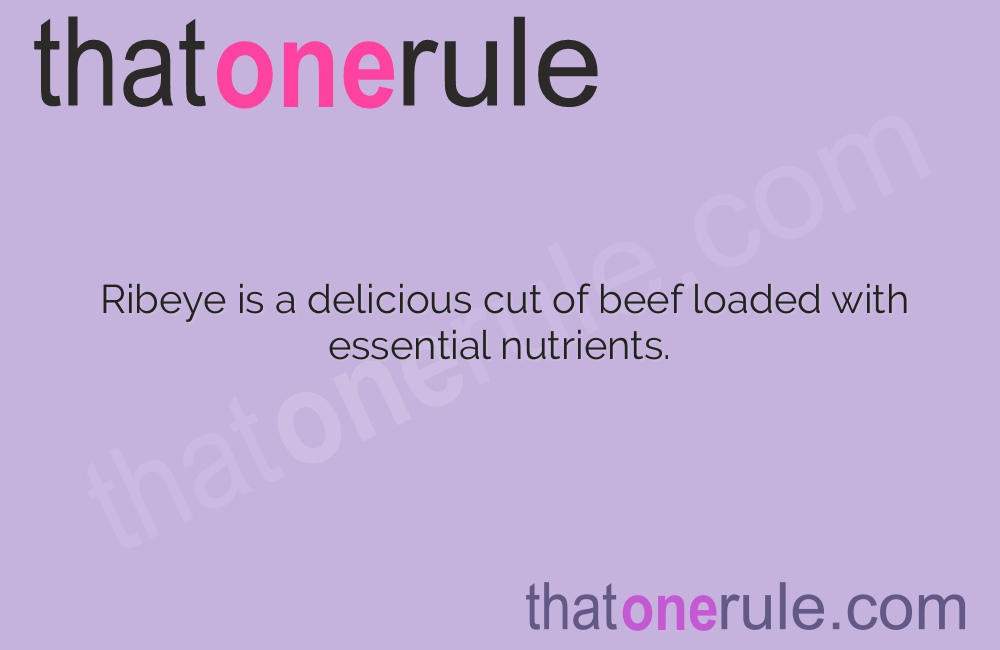Ribeye Nutrition Facts – Everything You Need to Know

Ribeye is a delicious cut of beef loaded with essential nutrients.
Indulging in a juicy ribeye steak can be a perfect way to boost your protein intake.
With its high iron content, ribeye can help prevent anemia and keep your energy levels up.
Ribeye is a great source of vitamin B12, which is essential for a healthy nervous system.
Despite its reputation for being fatty, ribeye contains monounsaturated fat, which can be beneficial for heart health.
The marbling in ribeye provides a mouthwatering, flavorful experience like no other.
Ribeye steak is a go-to choice for meat lovers who prioritize taste and nutrition.
Eating ribeye in moderation can be part of a balanced diet.
If you’re looking for a delicious way to meet your daily protein needs, ribeye is a fantastic choice.
Ribeye can be a great post-workout meal option for muscle recovery and growth.
With ribeye, you don’t have to compromise on taste while nourishing your body.
The high-quality protein in ribeye is essential for building and repairing tissues.
Ribeye steak can be a centerpiece for a memorable, hearty meal.
The rich flavor of ribeye makes it a popular choice among steak enthusiasts.
Ribeye is packed with essential amino acids necessary for optimal bodily functions.
Choosing grass-fed ribeye can provide additional health benefits, such as higher levels of heart-healthy omega-3 fatty acids.
Ribeye Nutrition Facts – Everything You Need to Know part 2
Ribeye is a versatile cut that can be cooked in various ways to suit different preferences.
The marbling in ribeye enhances its tenderness and juiciness, elevating your dining experience.
A well-cooked ribeye can be a rewarding treat for all your senses.
Pairing ribeye with colorful vegetables can create a balanced and nutritious meal.
Ribeye is a good source of zinc, which is important for a healthy immune system.
Marinating ribeye can add even more flavor and tenderize the meat.
Grilling a perfectly seasoned ribeye can be a delightful experience for any grill master.
With its high protein content, ribeye can help you feel fuller for longer, aiding in weight management.
Enjoying a succulent ribeye can be a rewarding indulgence after a long day.
Ribeye is a crowd-pleasing choice for gatherings and special occasions.
Adding ribeye to your diet can be a delicious way to increase your calorie intake if needed.
Ribeye is a versatile cut that pairs well with various sauces, seasonings, and side dishes.
Savoring a well-cooked ribeye can be an experience worth sharing and reminiscing.
The intense flavor of ribeye makes it a favorite choice for steak lovers around the world.
Ribeye is an excellent dietary source of phosphorus, which is essential for bone and teeth health.
Whether grilled, pan-seared, or oven-baked, ribeye always delivers an exceptional dining experience.
The juiciness of ribeye makes it a flavorful option even when cooked to well-done.
Ribeye can be a nutritional powerhouse when combined with a variety of vegetables and whole grains.
The generous marbling in ribeye contributes to its juiciness and melt-in-your-mouth texture.
Eating ribeye in moderation can be a part of a heart-healthy diet.
Ribeye is an excellent source of vitamin B6, which plays a crucial role in brain development and function.
A perfectly cooked ribeye can be the star of a homemade steak dinner that rivals any restaurant.
Choosing a high-quality ribeye can make a significant difference in taste and nutritional value.
The enticing aroma of a searing ribeye can tempt even the most discerning taste buds.
Ribeye is a nutrient-dense food that can help meet your daily vitamin and mineral requirements.
Ribeye can be an excellent choice for people following a low-carb or keto diet.
The tender texture of ribeye makes it a gratifying choice for steak connoisseurs.
Sautéing ribeye with garlic and herbs can enhance the flavors and make for a memorable meal.
Indulging in a well-seasoned ribeye can be a satisfying way to treat yourself while supporting your nutritional needs.

